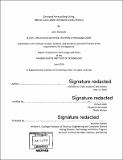Demand forecasting using Monte Carlo Multi-Attribute Utility Theory
Author(s)
Stefancik, John
DownloadFull printable version (28.36Mb)
Alternative title
Demand forecasting using Monte Carlo MAUT
Other Contributors
Technology and Policy Program.
Advisor
Richard Roth.
Terms of use
Metadata
Show full item recordAbstract
Volatile commodity prices over the past decade, environmentally-focused policy initiatives and new technology developments have forced manufacturers to consider the idea of substituting towards alternative materials in order meet both consumer and societal needs. The threat of substitution has created the need for manufacturing firms and other members of the supply chain to have the ability to understand the implications of substitution on future product market shares and overall raw material demand. This thesis demonstrates how Multi-Attribute Utility Theory (MAUT) can be extended to the group level to forecast future market shares by applying a distribution to the attribute weights and using a Monte Carlo simulation to capture the choices made by a heterogeneous set of decision makers. Unlike established demand forecasting techniques, such as discrete choice models, this methodology requires only a few data points from a handful of expert interviews and allows for systematic changes of preferences over time. Furthermore, the Monte Carlo MAUT methodology utilizes both revealed preference and stated preference data by integrating the two data types through a response surface methodology. Two case studies on underground distribution and overhead distribution power cables are explored in order to illustrate how the Monte Carlo MAUT methodology can be successfully applied in cases where there are diverse product types, limited numbers of decisions makers and historical market share data is sparse. Each case study illustrates how Monte Carlo MAUT can, on a regional basis, provide key insights into the impacts of changing commodity prices, changing product attribute levels, varying new technology learning rates and changing consumer preferences over time. Furthermore, an example of how Monte Carlo MAUT can be utilized to help policymakers evaluate the advantages, disadvantages and overall impact of different policy schemes within an environmental context is provided. Private firms and public governments alike can utilize Monte Carlo MAUT to improve their understanding of how market shares are likely to change over time, and more importantly, the key decisions needed on each party's behalf in order to maximize societal well-being.
Description
Thesis: S.M. in Technology and Policy, Massachusetts Institute of Technology, School of Engineering, Institute for Data, Systems, and Society, Technology and Policy Program, 2016. Cataloged from PDF version of thesis. Includes bibliographical references (pages 173-176).
Date issued
2016Department
Massachusetts Institute of Technology. Engineering Systems Division; Massachusetts Institute of Technology. Institute for Data, Systems, and Society; Technology and Policy ProgramPublisher
Massachusetts Institute of Technology
Keywords
Institute for Data, Systems, and Society., Engineering Systems Division., Technology and Policy Program.